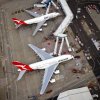eastwest101
Established Member
- Joined
- Oct 26, 2010
- Posts
- 3,446
- Qantas
- Gold
- Virgin
- Silver
..... but it does reinforce why customers keep adding additional orders to their 777 backlog like NZ whos profit results are not shabby.
And the longer that backlog for the current B777 production line and the wait for the next gen B777-X delivery slots get, the less options there are for QFi to act in the future except to go broke. And, as good as the A330neo or the A350 may be - delivery slots for them are getting further out of reach as well..
Its the ultimate illogical circular argument from QF management that they won't commit to new equipment until profitability is restored, and the best way to profitability? You guessed it! New fuel efficient equipment, which they aren't allowed to have because they are not profitable...... all the while - their competitors are ordering and receiving new equipment, that brings their competitors costs down, and leaves QFi further exposed. I am guessing that QF management are also waiting for the exchange rate to go against them as well - so that the next gen aircraft from the USA or Europe will be more expensive?
Free tip to Qantas management - when you have painted yourself entirely into a corner, time to stop painting and start thinking.
Last edited:















